Drinking tea has numerous benefits, both mental and physical, so it’s no surprise that so many women rely on drinking lemon and ginger tea during pregnancy to relieve some of the more uncomfortable side-effects of growing a human being!
One of the biggest benefits of drinking lemon and ginger tea while you’re pregnant is that it reduces nausea, a symptom that affects a vast majority of pregnant women.
But this combination is excellent for your digestive system, too, helping you fight indigestion.
Ginger also plays a crucial role in reducing stress and anxiety. Recent studies have produced promising results when it comes to the effects of ginger on managing anxiety.
Lemon ginger tea for pregnancy is a terrific immune system booster, too, enabling you to stay healthy and fight infections during this sensitive time.
Read on to learn more about this powerful combination, including a list of teas to avoid while you’re pregnant.
The Benefits Of Lemon And Ginger Tea During Pregnancy
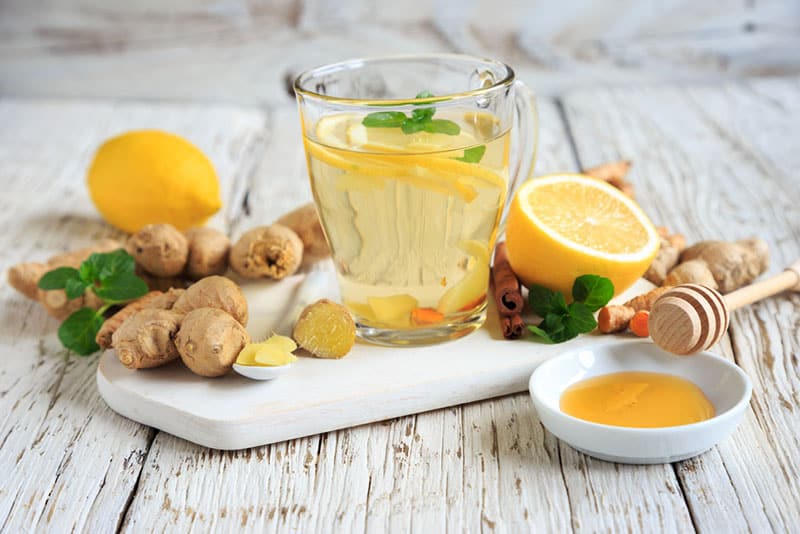
When drunk in moderation, a cup of lemon and ginger tea during pregnancy can be very beneficial to your health.
However, if you’re getting closer to your due date, have had abnormal vaginal bleeding, or are at an increased risk of miscarriage, you should avoid consuming ginger or at least consult your healthcare provider about your options.
As a rule of thumb, you shouldn’t consume more than 1 gram of ginger daily, which is equivalent to 4 cups of tea (made from pre-packaged tea bags) or 5 grams of ginger root, grated and soaked in boiling water to make homemade tea.
Going overboard with ginger can also cause uncomfortable side-effects such as gas.
When it comes to lemon, there is no specific recommended dose, but try not to ingest excessive amounts as it could cause tooth erosion and heartburn.
Here are some of the benefits of these herbal teas.
1. Helps with morning sickness

An overwhelming majority of pregnant women get nausea during the first trimester of their pregnancy, a symptom that is as annoying as it is uncomfortable.
But both ginger and lemon tea can help you fight pregnancy nausea!
For its part, ginger contains shogaols and gingerols – compounds that can increase the speed at which your stomach empties itself, helping minimize nausea.
Lemon, on the other hand, has a refreshing scent and taste that can help when feeling sick.
What’s more, lemon can be easily added to not just tea, but water as well, making it easier to stay hydrated and balance out any fluid loss that comes with vomiting.
2. Reduces indigestion

Ginger tea can improve the overall condition of your digestive system, especially if you struggle with gas, indigestion, or bloating.
Lemon has similar effects, so a combination of lemon and ginger tea during pregnancy can soothe an upset stomach and help with problems such as constipation.
3. Provides relief when you’re sick
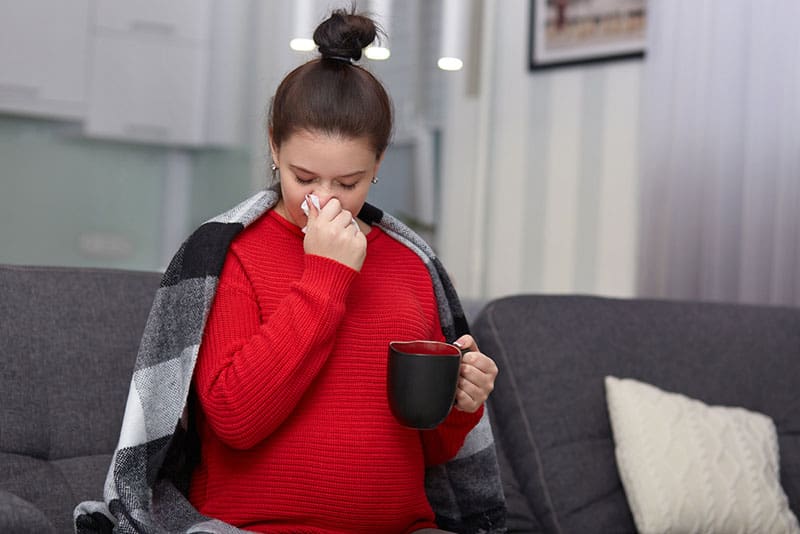
When you’re pregnant, your immune system goes through the wringer, so it’s possible that you might catch the common cold sometime during your pregnancy.
While catching a cold won’t hurt your baby, dealing with congestion and a sore throat on top of all the other pregnancy symptoms can be taxing, making it harder for you to focus during work and get a good night’s sleep.
Lemon ginger tea with a bit of honey is just what you need to feel better and kick the cold to the curb in no time.
4. Reduces stress

Are you suffering from increased stress and anxiety?
It is said that drinking lemon and ginger tea during pregnancy can help you deal with anxiety, which is definitely even more important while you’re pregnant and going through so many emotional and physical changes.
A 2017 study conducted on mice showed ginger extract was just as successful in treating anxiety as conventional medication.
Although the study involved animals instead of humans, this is a positive indication of the possible mental health benefits of ginger tea.
So if you’ve had a difficult day, curl up with a cup of ginger and lemon tea and wait for the relaxation to kick in! And don’t forget to do some breathing exercises too.
5. Boosts immune system

Staying healthy is of paramount importance during all stages of pregnancy.
While you’re probably taking prenatal supplements already, it doesn’t hurt to boost your immune system through tea as well.
Drinking lemon and ginger tea during pregnancy will help your body fight infections, making it one of the best teas to improve your overall health.
6. Helps you lose weight

After you give birth, you might be concerned about losing your baby weight. Ginger might help you during this process, as it contains antioxidants that improve your overall health.
And a 2012 study found that consuming ginger can help with weight loss as it keeps you feeling full for longer periods of time.
Adding lemon juice to a cup of ginger tea will further suppress your appetite, helping you lose weight.
If you’re planning on breastfeeding, the excellent news is that ginger boosts milk supply, allowing you to breastfeed your little one without worrying that you’re not producing enough milk.
A Note On Teas With Caffeine
When it comes to teas with caffeine, such as black tea and green tea, you need to pay special attention to your daily consumption.
The American Pregnancy Association recommends limiting how much caffeine you drink per day. Obviously, the best option is to completely avoid it while you’re pregnant.
But if you decide to consume drinks with caffeine content, you should know that it’s only recommended for a pregnant woman to consume from 150 mg to 300 mg of caffeine per day.
Drinking too much caffeine can cause complications such as low birth weight and even miscarriage.
In a cup of green tea, for instance, there can be anywhere between 30 mg and 50 mg of caffeine. As for black tea, it usually contains around 50 mg per cup.
Considering that an average cup of coffee contains around 95 mg of caffeine, a cup of green or black tea is still a better option if you need to get your daily caffeine fix. Just make sure to keep it to a minimum.
Teas You Should Avoid While Pregnant
While herbal teas can be a natural remedy against a plethora of health conditions, it’s best to practice caution with certain teas, especially in early pregnancy.
Make sure to check the ingredient list of every herbal blend tea as it might contain herbs that could pose a risk to your pregnancy.
Keep in mind that you might run into conflicting information on the internet as well, so talk to your doctor if you would like to try a new tea while pregnant but aren’t sure if it’s safe.
1. Peppermint tea
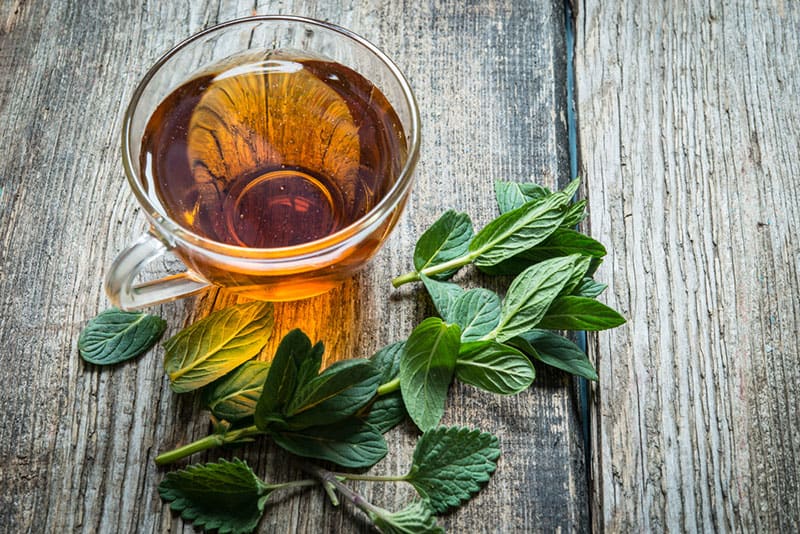
With such a refreshing and delicious taste, it’s hard to say no to peppermint tea.
It’s a natural remedy for constipation and other digestive issues, and a warm cup will make you feel better when you’re sick or battling a sinus infection.
And when you add some lemon juice, it gives peppermint an extra kick.
However, there are experts who recommend avoiding it in your early pregnancy – peppermint can cause slight uterine contractions and it’s important to avoid that in the first trimester.
There’s an interesting connection between peppermint and breastfeeding, too.
It can be used to lower milk supply, but only if you drink it in excessive amounts every day. But having just one cup probably won’t hurt.
2. Chamomile tea

Chamomile is a personal favorite of mine. It tastes delicious, helps you wind down at the end of a long day, lowers blood sugar, and eases stress. Plus, it can even be used as a remedy for babies who are teething.
But chamomile tea should be avoided during the first trimester for the same reasons as peppermint tea – it might cause uterine contractions.
3. Licorice

Make sure that the tea you’re drinking while pregnant doesn’t contain any licorice as there is some evidence that it can have an impact on the baby’s brain development.
You’ll also want to avoid snacking on licorice candy while you’re pregnant.
4. Raspberry leaf tea
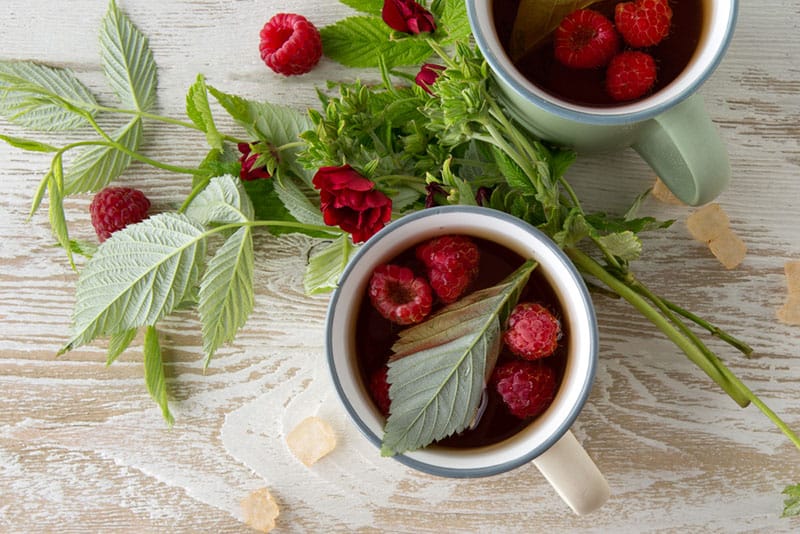
Despite the fact that evidence is inconclusive regarding its effects on labor, many pregnant women drink raspberry leaf tea to kickstart the labor process – which is exactly why you should avoid it in the first trimester, as there is a possibility it could cause uterine contractions.
After your baby arrives, however, feel free to drink it – it might speed up your postpartum recovery!
5. Ginseng tea
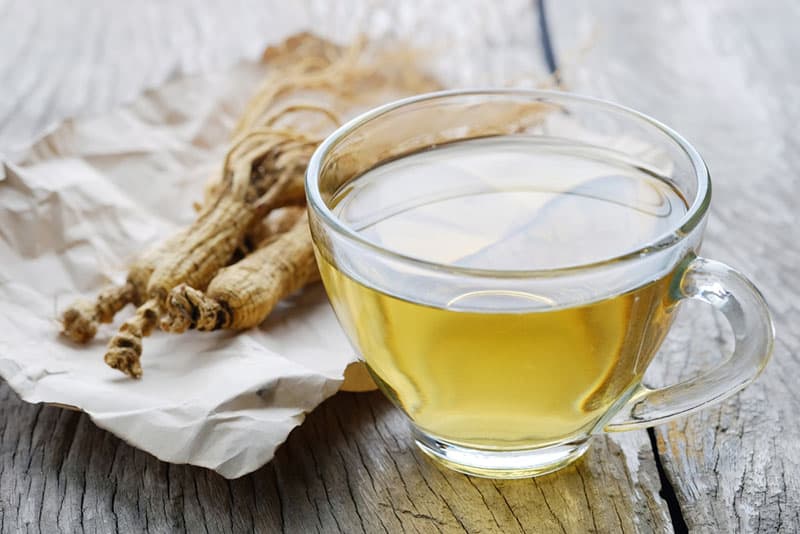
While most teas that should be avoided during pregnancy can cause mild uterine contractions, ginseng tea should be avoided because there’s a chance it could cause birth defects, especially when consumed during the first trimester.
Although the 2003 study that discovered the correlation between ginseng and its effect on a developing embryo researched rats, rather than humans, considering the harmful effects that were observed during the study, it’s best for women to steer clear of ginseng while pregnant.
Final Thoughts
So, if you were wondering if you can drink lemon ginger tea when pregnant, now you know that it has numerous benefits for your health.
As long as you drink it in moderation, you should be perfectly fine.
While lemon isn’t likely to cause you any trouble as long as you don’t consume too much, you should make sure not to overdo it with ginger – it’s best to stick with the recommended dose of 1 gram per day.
After you give birth, you can rely on ginger and lemon to help you get back into shape as scientists have proven ginger can keep you feeling full for longer periods of time.
And because this combination is terrific for your immune system, it will keep you healthy by fighting off infections.
You can make ginger and lemon tea using fresh ginger or ginger tea bags – just read the ingredient list carefully to make sure there aren’t any other herbs added that could potentially hurt you or the baby, especially if you are in the early stages of your pregnancy.
References:
• Chan, L.Y., Chiu, P.Y., & Lau, T. (2003). “An in-vitro study of ginsenoside Rb1-induced teratogenicity using a whole rat embryo culture model. Human reproduction”, 18(10), 2166-2168.
• American Pregnancy Association. (2016). “Caffeine During Pregnancy [Blog post]”. Retrieved from American Pregnancy Association website.
• Mansour, M. S., Ni, Y. M., Roberts, A. L., Kelleman, M., Roychoudhury, A., & St-Onge, M. P. (2012). “Ginger consumption enhances the thermic effect of food and promotes feelings of satiety without affecting metabolic and hormonal parameters in overweight men: a pilot study. Metabolism: Clinical and Experimental”, 61(10), 1347–1352.
• Fadaki F., Mehrdad Modaresi M., Sajjadian I. (2017). “The effects of ginger extract and diazepam on anxiety reduction in animal model.” Indian Journal of Pharmaceutical Education and Research, 51(3), S159-S162.
READ NEXT: The Best Guide On What To Drink When Pregnant And What To Avoid
Like this post? Please share or pin it for later. You can also stay in the loop and follow us on Facebook, Instagram or Pinterest.

This post contains affiliate links. Please see our full disclosure for more info.

